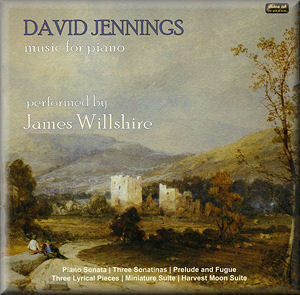 |
 |
|

Support
us financially by purchasing this disc from: |
|
|
|
|
|
|
David JENNINGS
(b.1972)
Piano Sonata Op. 1 (1995) [21:18]
Sonatina No. 1, Op. 2 No. 1 [4:43]
Sonatina No. 2 Op. 2 No. 2 [9:26]
Sonatina No. 3, Op. 2 No. 3 [7:19]
Prelude and Fugue Op. 6 [5:28]
Three Lyrical Pieces Op. 17 [7:03]
Miniature Suite Op. 18 [7:58]
Harvest Moon Suite Op. 19 [14:37]
 James Willshire (piano)
James Willshire (piano)
rec. July 2012, Brewery Arts Centre, Kendal, Cumbria
 DIVINE ART DDA 25110 [78:10]
DIVINE ART DDA 25110 [78:10]
|
|
|
David Jennings was born in 1972, and studied with John Casken.
Strongly immersed in music of the British Musical Renaissance
he has also been influenced by poetry and the visual arts. He
has composed in a variety of forms but this disc concentrates
on music for piano. The earliest of these works are rooted in
his childhood.
The Piano Sonata No.1 was started in 1988 and completed in 1995,
though revisions meant that it didn't reach its present form
until 2009. A long gestation, certainly. It covers a pleasing
amount of stylistic ground: calm initially but soon subject
to tauter, twistier material, then a snazzy, jazzy Scherzo with
some good rolling left hand. Then there are more calm, almost
Debussian harmonies in the Romance third movement with
a contrasting section full of velocity. Written in the mid to
late 1980s, the three Sonatinas are succinct and highly communicative,
revealing baroque hints as well as other kinds of influence.
One such is the ‘Satie Barcarolle’ effect of the
central Elegy of the first Sonatina or the Bachian elements
of the second. One might think that the Prelude and Fugue Op.6
would build upon certain neo-classical elements that are present
in the composer's music. However this is a much thornier work
altogether and one that enshrines quite a rigorous use of twelve-tone
throughout its five-minute length.
The Three Lyrical Pieces were written in 2010 and they're
very charming 'Old School' pieces which nod to early twentieth-century
British piano writing. His next opus was Miniature Suite,
which certainly lives up to its name: the five movements last
eight minutes in total. This sees Bach gently modified, updated
and generally dabbled with, not least via unexpected modulations.
The Invention, the third of the movements, sounds like
a thoroughly subverted piece from A Bach Book for Harriet
Cohen. By contrast the disc ends with Harvest Moon
Suite, a series of six charming watercolours, whether gentle
of more lurid. The Haunted Abbey, for instance, its title
derived from a William Payne painting, is decidedly Hammer Horror,
though Harlech Castle is gaunt, and Innisfallen Lake
sonorous and evocative.
The composer reveals himself to be admirable equipped in writing
for the piano and James Willshire seems an ideal interpreter.
Jonathan Woolf
see also reviews by John
France and Gary
Higginson
Support
us financially by purchasing this disc from: |
|
|
|
|
|
|
|















